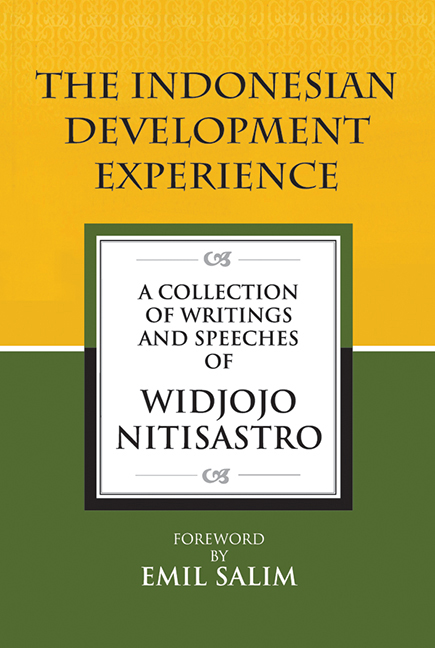Book contents
- Frontmatter
- Dedication
- Frontispiece
- Contents
- Foreword
- Introduction
- Part I PLANNING OF INDONESIA'S DEVELOPMENT
- Part II IMPLEMENTATION OF INDONESIA'S DEVELOPMENT
- Part III FACING VARIOUS ECONOMIC CRISES
- Part IV SETTLEMENT OF FOREIGN DEBT
- Part V EQUITABLE DEVELOPMENT
- Part VI INDONESIA AND THE WORLD
- 26 In the Mutual Interest of Rich and Poor Nations (1982)
- 27 Indonesia Chaired the OPEC Conference in Bali at a Time When Iran and Iraq were at War (1980)
- 28 Fifteen World Economic Phenomena That Stood Out During the Decade of the 1980s (1989)
- 29 Perception of Interdependence But Lack of Meaningful Action (1984)
- 30 Advancing Mutual Understanding and Mutual Confidence (1996)
- Index
- About the Author
26 - In the Mutual Interest of Rich and Poor Nations (1982)
from Part VI - INDONESIA AND THE WORLD
Published online by Cambridge University Press: 21 October 2015
- Frontmatter
- Dedication
- Frontispiece
- Contents
- Foreword
- Introduction
- Part I PLANNING OF INDONESIA'S DEVELOPMENT
- Part II IMPLEMENTATION OF INDONESIA'S DEVELOPMENT
- Part III FACING VARIOUS ECONOMIC CRISES
- Part IV SETTLEMENT OF FOREIGN DEBT
- Part V EQUITABLE DEVELOPMENT
- Part VI INDONESIA AND THE WORLD
- 26 In the Mutual Interest of Rich and Poor Nations (1982)
- 27 Indonesia Chaired the OPEC Conference in Bali at a Time When Iran and Iraq were at War (1980)
- 28 Fifteen World Economic Phenomena That Stood Out During the Decade of the 1980s (1989)
- 29 Perception of Interdependence But Lack of Meaningful Action (1984)
- 30 Advancing Mutual Understanding and Mutual Confidence (1996)
- Index
- About the Author
Summary
Introductory Note: Every year the European Economic Forum organize the Davos Symposium at Davos, Switzerland, which usually are attended by many present and former cabinet members of developed and developing countries as well as important business leaders. Many officials from developing countries use the opportunity to attract foreign investment into their countries. I was invited to attend and address the Davos Symposium in 1982. While I highlighted some pertinent aspects of Indonesia's development and the opportunity they offer for mutually advantageous business and industrial cooperation, I spent some time explaining on how we in Indonesia agree with the view that the current state of the world economy was freewheeling into stagnation. The persistent crises of the world economy are symptomatic of a structural malfunctioning of the international economic system and a basic imbalance in international economic relations. It is indeed in the mutual interest of rich and poor countries:
• to increase the availability of financial resources to the developing countries through bilateral and multilateral channels to alleviate debt burdens, meet liquidity needs and ensure continued development;
• to increase world food production and to assure international food security;
• to achieve greater stability and predictability in the supply of raw materials at prices remunerative to producers and fair to consumers;
• to halt and reverse the present dangerous slide towards more protectionism;
• to provide the multilateral financial institutions with the necessary capabilities to play a greater role in channeling financial resources to the developing countries.
I am genuinely pleased to be able to participate in this 1982 Davos Symposium and would like to thank our hosts, the European Management Forum, for providing me the opportunity to highlight some pertinent aspects of Indonesia's national development and the opportunity they offer for mutually advantageous business and industrial cooperation.
Before doing so, however, allow me to say a few words on how we in Indonesia see the current state of the world economy, for I think you will agree with me that in the world in which we live today sustained economic progress can only be made at the national level if it can be assured at the global level.
I am not a pessimist by nature. However, I cannot but fully support the view of an imminent European statesman, our chairman Mr Edward Heath, who stated that the international economy is freewheeling into stagnation.
- Type
- Chapter
- Information
- The Indonesian Development ExperienceA Collection of Writings and Speeches, pp. 297 - 303Publisher: ISEAS–Yusof Ishak InstitutePrint publication year: 2011

